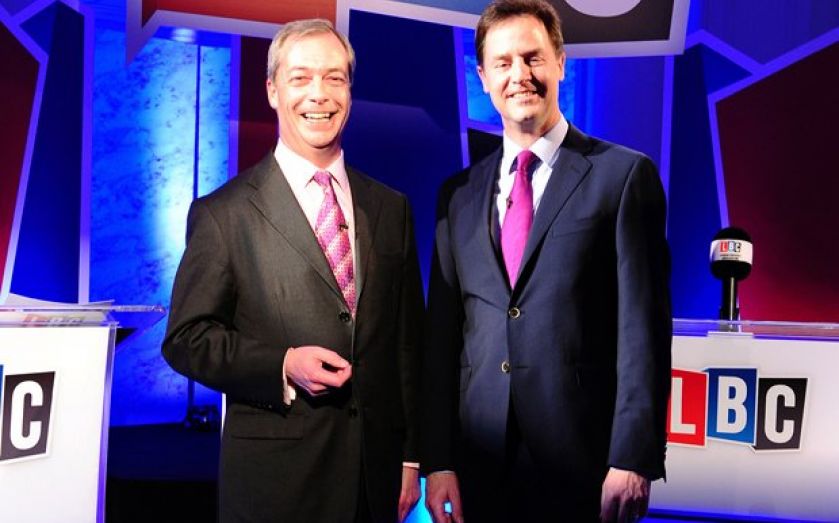An earthquake bigger than Ukip: Only radical EU reform will be enough

MAKE no mistake, these European elections are an earthquake that should make political leaders across the EU sit up and take notice. While pundits will debate why Ukip topped the polls in the UK, more significant is that the public has made it clear that they want a big change in Britain’s relationship with the EU.
Nearly 60 per cent of those who voted chose parties (the Conservatives, Greens or Ukip) that have promised an In/Out referendum. Meanwhile, the party that most represents the EU status quo, the Liberal Democrats, were wiped out, while Labour, which has dodged the referendum question, had little to write home about. Ukip’s triumph, and the fact that the Conservatives did not fare as poorly as had been predicted, show that the tactic adopted by Labour and the Liberal Democrats – of paying lip-service to “EU reform” but shying away from big changes – is not going to cut it.
But the sort of change the British public and business wants can only come from renegotiation backed by a referendum – to end the uncertainty forever. All parties must accept that, and must start setting out what kind of a deal they want to secure for Britain. Before the election, Nick Clegg spoke of travelling to every European capital to build support for reform. But without a referendum up his sleeve, it wasn’t plausible that he could achieve very much. Those calling for reform of the flawed terms of our EU membership, but not backing a referendum in 2017, should take heed.
And it is not only in the UK where this sentiment is being expressed. Fed up with leaders who refuse to discuss serious change, electors across Europe have voted for parties who want to undo “ever closer union”. In France, we have seen the rise of the Front National, in Germany the anti-euro Alternative fur Deutschland has begun to win seats, while extreme parties continue to do well in the Mediterranean states.
Unfortunately, the whole debate has been blighted by scaremongering. Look at what happened after David Cameron made his speech at Bloomberg last year: those claiming to represent the business community warned that a public vote would create uncertainty. One year on, neither the public or our economy seem to have agreed. And this weekend’s results show where such a dogged commitment to the status quo leads: support for explicitly “out” parties. The public may be unsure about leaving the EU, but they’re clear that they want big changes to the way Europe is run.
So far, politicians have been vague about what powers they want to get back. But at Business for Britain, we have begun to spell out what such a new relationship might look like: exempting SMEs and startups from the full burden of EU red tape would be a good start. Since the Lisbon Treaty was enacted in 2009, EU regulations stemming from (or modified by) the Treaty have had a net cost to UK companies of £6.1bn annually, for example, yet 95 per cent of UK firms don’t export to the EU at all. Cameron’s promise to remove reference to “ever closer union” is another important symbolic act, and should be considered an essential part of any renegotiation package, providing measures are put in place to ensure Britain isn’t dragged along as other member states integrate.
Were Ed Miliband and Clegg to embrace renegotiation and a referendum, they’d find friends in UK businesses – friends they desperately need. The polling couldn’t be clearer: ask businesses where powers should lie, and the overwhelming majority say London. A survey of business leaders by YouGov last year found that, by 46 to 37 per cent, businesses now say the costs of EU membership outweigh the benefits. Securing a better deal would not only help pacify public anger, but would make Britain more competitive. And Europe’s crisis of competitiveness is stark. Earlier this year, a report by Jim O’Neill, formerly of Goldman Sachs, showed that the EU lost 10 percentage points of its share of total world trade over the last decade, while the Brics’ share tripled.
Setting out what kind of deal they want in more detail, and a clearer vision for reform of the EU, is essential for political leaders to regain voter trust. A big reason for Ukip’s rise is that voters don’t believe the current crop of politicians. Giving clarity over what EU reforms Britain is looking for, and indicating that we are prepared to walk away should we not get them, would draw a clear line against which politicians can be held accountable.
Politicians need to make the case for a new relationship with the EU, not scaremonger. Business leaders who think that Britain would be better off in the EU should start to outline what a new relationship between Britain and the EU would look like and – most importantly – back a referendum to ensure that we get it. That is the only viable response to this weekend’s historic results.
Matthew Elliott is chief executive of Business for Britain (@Matthew_Elliott).